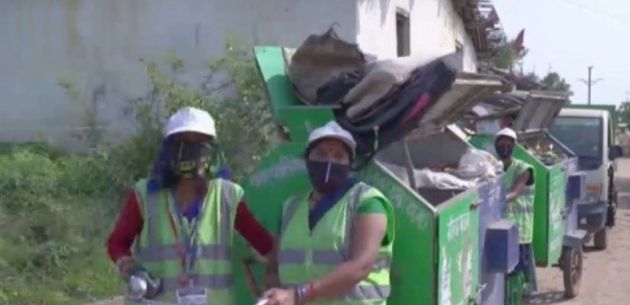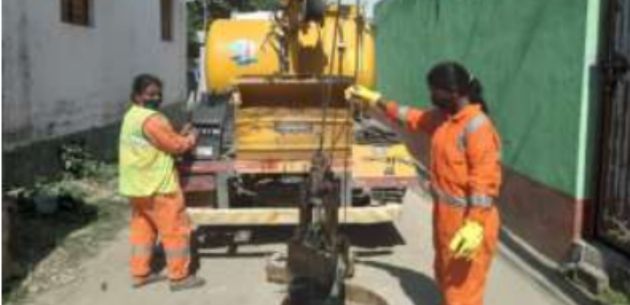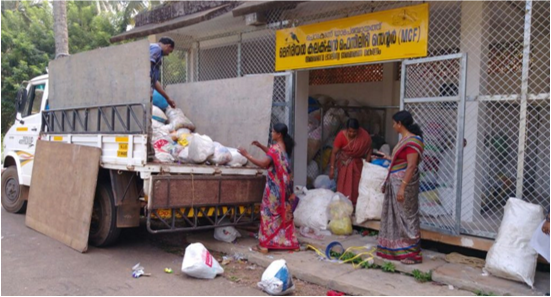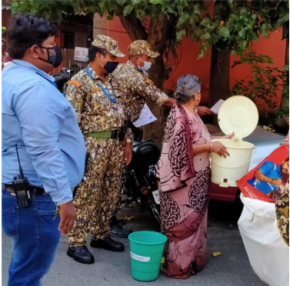Sanitation workers or the frontliners are the champions of Urban sanitation in India. Involved in various tasks across the sanitation value chain, including cleaning toilets and spaces; cleaning and emptying sewers, septic tanks and drains; operating sewage treatment plants, etc., their role in transforming urban india is commendable. The uninterrupted services by frontline sanitation workers play a crucial role in ensuring waste collection, segregation, transportation and processing.

With the introduction of mechanized waste management processes, sanitation workers have had to adapt to new equipment and technologies. This shift often requires them to learn new skills and operate machinery effectively and safely. To meet the demands of modern waste management practices, sanitation workers have had to undergo training to acquire specialized skills. This training may include learning about waste segregation, recycling techniques, operating machinery, and following safety protocols. They have braved it all.
Under Swachh Bharat Mission-Urban (SBM-U), efforts have been made to formalize their employment, ensuring fair wages, social security benefits, and improved working conditions with emphasis on safe cleaning processes. The SafaiMitras, the Swachhaginis, the Swachhata Didis, the Marshals all are leading from the front and have been exemplary in spreading awareness on sanitation and waste management in Urban India.


The inspirational stories of these Movers and shakers of swachhata are innumerable. Over 400 women
sanitation workers in Ambikapur perform daily sanitation duties. Swacchata Didis go door-to-door to
collect waste, segregate liquid, solid waste, harmful domestic and sanitary waste. This waste is then
segregated across 20 biodegradable and 17 non-biodegradable categories at the SLRM centres and recycled
into resources such as animal feed, compost, other reusable items. While In Patna, women ‘Swachhaginis’
from informal settlements are involved in mechanized manhole cleaning. Swachhaginis have been cleaning
up blockages in drains, underground siphons or conduits with the help of jetting and rodding system and
mechanized cleaning of septic tanks.
Down south in Kerala, the women-led task force, Harithakarmasena, takes care of sanitation and waste
management in all wards. They provide technical services and solutions for waste management projects and
are responsible for collection, transportation, processing, disposal and management of waste in
collaboration with respective Local Self Government Institutions (LSGIs).


The Bruhat Bengaluru MahanagaraPalike (BBMP) Marshals patrol areas under their jurisdiction and stop
citizens from littering, dumping garbage, polluting water bodies, parks and other public spaces. They
also educate citizens on waste segregation, forbid plastic usage and levy fine on violators.
The recently concluded Swachhotsav camapign under SBM-U recognized and celebrated the transformation of
women in sanitation to women-led sanitation. It was a platform that empowered over 400,000 women
entrepreneurs who are taking on leadership roles in urban sanitation. The campaign saw Swachhata Doots’
from 29 States/UTs participate in Swachhata Yatra. They travelled to 13 different States to cross-learn
and share new ideas for scaling up waste management and ‘waste to wealth’ initiatives. The Garbage Free
Cities Influencers network was created to integrate SHGs and their federations as partners in
implementing SBM-U 2.0. The SHG members are now swachhata agents at the community level to generate
awareness on the mission’s objectives.
The swachhata warriors have been motivating urban India to identify the vision of SBMU 2.0. Their inspirational journey is bringing together all forces to build garbage-free cities.
Website : www.sbmurban.org
Facebook : Swachh Bharat Mission - Urban | Twitter: @SwachhBharatGov
Instagram: sbm_urban | YouTube: Swachh Bharat Urban | Linkedin: swachh-bharat-urban